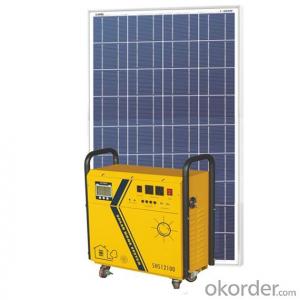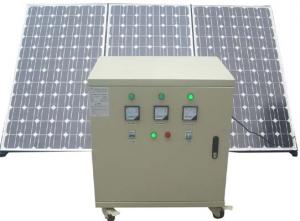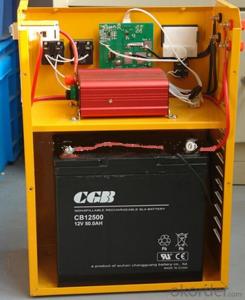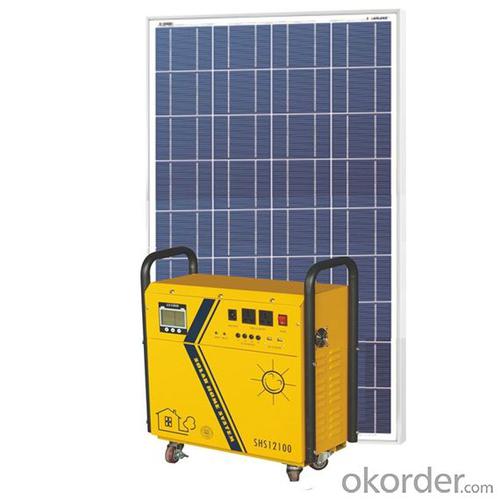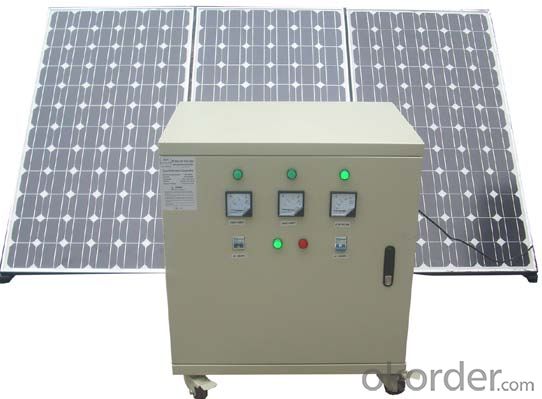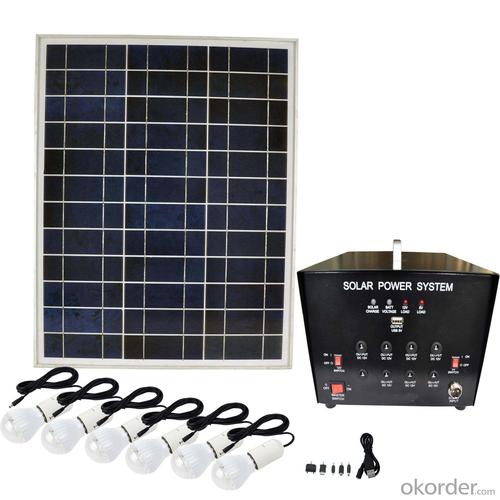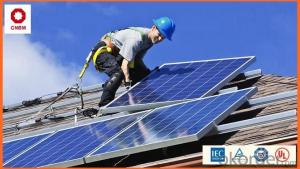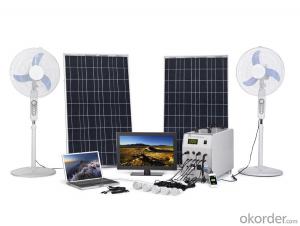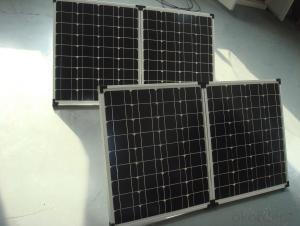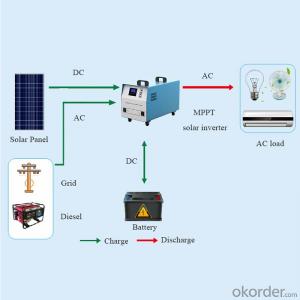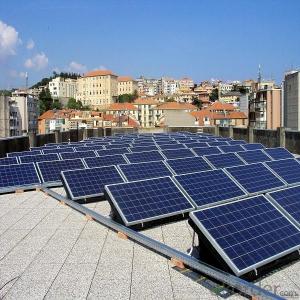Portable Solar Power Systerm Kits/Camping Kits Home Use 2000W Solar System
- Loading Port:
- Shanghai
- Payment Terms:
- TT or LC
- Min Order Qty:
- 2000 watt
- Supply Capability:
- 200000 watt/month
OKorder Service Pledge
OKorder Financial Service
You Might Also Like
| Specifications |
| 1.Solar panel: 200W |
| 2.Lead acid Battery: 100Ah |
| 3.Inverter: output 600W |
| 4. Self design manufacturer |
Portable Solar Power Systerm Kits/camping kits home use 2000w solar system
RODUCT DSCRIPTION
1. This is an off-gird solar power system, designed to provide stable and reliable electricity to homes or communities without access to grid electricity or to those regions where are short of power or even without power.
2. This solar power system is convenience to move with handle and wheels.
3. The full-feature LED/LCD display features system monitoring so that you always know how much power reserve is left in the batteries, allowing you to plan accordingly.
4. It is easy to set-up with reliable performance, making it ideal for situations where emergency power is required.
5. It is an ideal and reliable energy source for a wide variety of applications, ranging from lighitng, radios, fans, televisions, computers, refrigerator.
6. The USB port is compatible with all 5V-USB charged devices.
7. It can also act as a back-up power source during emergency situations.
8. Adapt the solar power system to meet your requirements, OEM is acceptable.
Portable Solar Power Systerm Kits/camping kits home use 2000w solar system
| Technical Data | |
| MODEL: Solar Power System SHS12100 | |
| 1. Plug & Play Integrated Power Box | |
| Display | LED screen |
| Controller | Build-in, 15A/12V, PWM |
| Battery | 200Ah/12V, Lead-acid |
| Inverter | Build-in, 600W pure since wave |
| Outlet | DC outlets12V/1A x 4 |
| AC outlets 220V/ 600W x 2 | |
| USB port | 5V/1A x 2 |
| Grid charging port | 15V/5A x 1 |
| Rating charging current | 15A |
| Rated working voltage | 12V |
| Low voltage protection | 10.7V |
| Low voltage recovery | 12.6V |
| Float charging voltage | 14V |
| 2. Solar Panel | |
| Power | 200W |
| Cell type | Monocrystalline silicon |
| Number of cell | 72pcs |
| Vmp | 18V |
| Imp | 11.1A |
| Power tolerance | ±5% |
| Voc | 22.32V |
| Isc | 11.54A |
| Operating temperature | -40°c to 80°c |
| Size | 1580*808*35mm |
| Weight | 13kg |
| 3. Other accessories (Optional) | |
| LED Bulb | 12V/5W x2pcs |
| E27 4m's cable with Switch & Socket | |
| AC charger | 1PC |
| Cable for LED bulbs | 1 by 2 Extension Cable 5 meters x 1 |
| Cable for Solar Panel | 10 meters for 4m² space |
FUNCTIONS
THE POWER CASE FUNCTIONS OF SOLAR POWER SYSTEM
1.Battery charging function
2.Low voltage disconnection function(LVD)
3.High voltage disconnection function(HVD)
4.Electronic overload protection
5.Short circuit protection
6.High temperature protection
7.Indicator got working status
8.DC 5V and DC 12V output
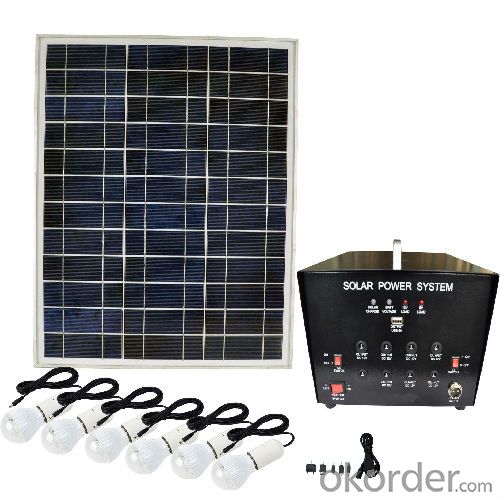
RELATED PRODUCTS
| System Type | AC/DC Off Gird Solar Power System | ||||
| Model | SHS1250 | SHS1265 | SHS12100 | SHS12200 | SHS24200 |
| Solar Panel | 100W | 150W | 200W | 2x200W | 2x300W |
| Battery | 50Ah | 65Ah | 100Ah | 200Ah | 2x200Ah |
| Output Power | 300W | 500W | 600W | 1000W | 1500W |
| Modified wave | Modified wave | Pure sine wave | Pure sine wave | Pure sine ware | |
| Carton Size | 300*180*470mm | 400*180*470mm | 525*248*640mm | 615*302*640mm | 600*550*420mm |
| Applicable Scope | TV, Fan, Radio, Refrigerator, Air-conditioner | ||||
- Q: Can solar energy systems be used in areas with limited access to social services?
- Yes, solar energy systems can be used in areas with limited access to social services. Solar energy systems, such as solar panels, can be installed in remote areas where traditional electricity grids are unavailable. These systems can provide clean and sustainable energy for various purposes, including powering homes, schools, healthcare facilities, and water pumping stations. By utilizing solar energy, communities with limited access to social services can have a reliable source of electricity, improving their living conditions and enabling the provision of essential services.
- Q: What is the role of maximum power point tracking (MPPT) in a solar energy system?
- The role of maximum power point tracking (MPPT) in a solar energy system is to optimize the efficiency and output of the system by continuously tracking and adjusting the operating point of the solar panels to the maximum power point. This ensures that the panels are operating at their peak power production, maximizing the amount of energy captured from the sunlight and increasing the overall efficiency of the solar energy system.
- Q: Can a solar energy system be installed in areas prone to hailstorms?
- Yes, solar energy systems can be installed in areas prone to hailstorms. However, it is essential to consider certain factors to ensure their durability and resilience against hail damage. This includes using high-quality materials, such as tempered glass for solar panels, and proper installation techniques. Additionally, some solar panels are specifically designed to withstand hail and extreme weather conditions, providing further protection.
- Q: Can solar energy systems be installed on vehicles?
- Yes, solar energy systems can be installed on vehicles. These systems typically consist of solar panels that capture sunlight and convert it into electricity, which can be used to power various components of the vehicle. Solar energy systems on vehicles are commonly found on electric cars, RVs, boats, and even bicycles, providing a sustainable and renewable source of power for charging batteries or running appliances.
- Q: What is the role of solar energy tracking systems?
- Solar energy tracking systems play a crucial role in maximizing the efficiency and output of solar panels. These systems continuously monitor and adjust the position of solar panels to ensure they are always directly facing the sun. By tracking the sun's movement throughout the day, these systems optimize the amount of sunlight captured, resulting in increased energy production.
- Q: How does the efficiency of solar panels affect a solar energy system?
- The efficiency of solar panels directly impacts the overall performance and output of a solar energy system. Higher efficiency panels convert a greater percentage of sunlight into usable electricity, resulting in increased energy production. This means that with more efficient solar panels, a solar energy system can generate more power, potentially reducing the need for additional panels and increasing the system's overall effectiveness in meeting energy demands.
- Q: Can solar energy systems be used for heating and cooling homes?
- Yes, solar energy systems can be used for heating and cooling homes. Solar energy can be harnessed through the use of solar panels or solar water heaters to generate electricity or heat. This energy can then be used to power heating and cooling systems in homes. For heating, solar energy can be used in various ways. Solar thermal systems can be installed to heat water for radiant floor heating or to generate steam for heating. Solar air heating systems can also be used to heat air, which can then be distributed throughout the home using ductwork and fans. Additionally, solar heat pumps can be utilized to transfer heat from the sun into the home. Similarly, solar energy can be utilized for cooling homes. Solar-powered air conditioning systems can be employed, which use solar energy to drive the compressors and fans needed for cooling. These systems can be especially effective in hot climates where the availability of sunlight aligns with the need for cooling. In both heating and cooling applications, the use of solar energy systems offers several advantages. It is a clean, renewable source of energy, reducing the reliance on fossil fuels and minimizing carbon emissions. Solar energy systems also provide long-term cost savings, as they reduce or eliminate the need for traditional heating and cooling methods that rely on grid electricity or fossil fuels. Additionally, solar energy systems can be integrated into existing homes or incorporated into new construction, making them a versatile and sustainable option for heating and cooling homes.
- Q: Are there any advancements in solar energy system technology?
- Yes, there have been significant advancements in solar energy system technology in recent years. These advancements include improved solar panel efficiency, development of new materials and designs for panels, increased energy storage capacities, and integration of smart grid technologies. Additionally, there have been innovations in solar tracking systems, solar concentrators, and the use of perovskite solar cells, which have the potential to further enhance the efficiency and affordability of solar energy systems.
- Q: Can solar energy systems be used for powering sports stadiums or arenas?
- Absolutely, sports stadiums or arenas can definitely utilize solar energy systems for power. In fact, numerous stadiums and arenas worldwide have already begun implementing solar energy as an environmentally-friendly and economically-viable power source. Solar energy systems, like solar panels, capture the sun's energy and convert it into electricity. This generated electricity can then be utilized to power various components of sports stadiums or arenas, including lighting, scoreboards, sound systems, and even electric vehicle charging stations. The quantity of solar energy required to power a stadium depends on its size, energy requirements, and the level of energy efficiency implemented. There are multiple advantages to employing solar energy in sports stadiums or arenas. Firstly, it is a clean and renewable energy source, contributing to a reduction in greenhouse gas emissions and a decrease in reliance on fossil fuels. This aligns with the increasing global focus on sustainability and combatting climate change. Secondly, solar energy offers long-term cost savings. Although the initial installation costs may be higher compared to traditional energy sources, the operational and maintenance expenses of solar panels are relatively low. Over time, the energy generated by solar panels can offset electricity costs, resulting in significant savings in the long run. Furthermore, solar energy systems can also serve as a visible symbol of environmental responsibility, inspiring fans, athletes, and communities to adopt sustainable practices. Sports stadiums and arenas often attract large audiences and media attention, making them high-profile venues. By embracing solar energy, these facilities can demonstrate their commitment to clean energy and motivate others to do the same. In conclusion, solar energy systems can effectively power sports stadiums or arenas. They provide a clean, renewable, and cost-effective alternative to traditional energy sources, while also promoting sustainability and inspiring others to embrace clean energy solutions.
- Q: How much space is needed for installing a solar energy system?
- The amount of space needed for installing a solar energy system depends on various factors such as the size and type of the system, the energy requirements, and the available sunlight. Generally, a small residential solar energy system can be installed on rooftops or in a backyard with an area of about 100-400 square feet, while larger systems for commercial or industrial use may require several acres of land. It is important to conduct a site assessment to determine the suitable space for installation based on individual needs and local conditions.
Send your message to us
Portable Solar Power Systerm Kits/Camping Kits Home Use 2000W Solar System
- Loading Port:
- Shanghai
- Payment Terms:
- TT or LC
- Min Order Qty:
- 2000 watt
- Supply Capability:
- 200000 watt/month
OKorder Service Pledge
OKorder Financial Service
Similar products
Hot products
Hot Searches
Related keywords
